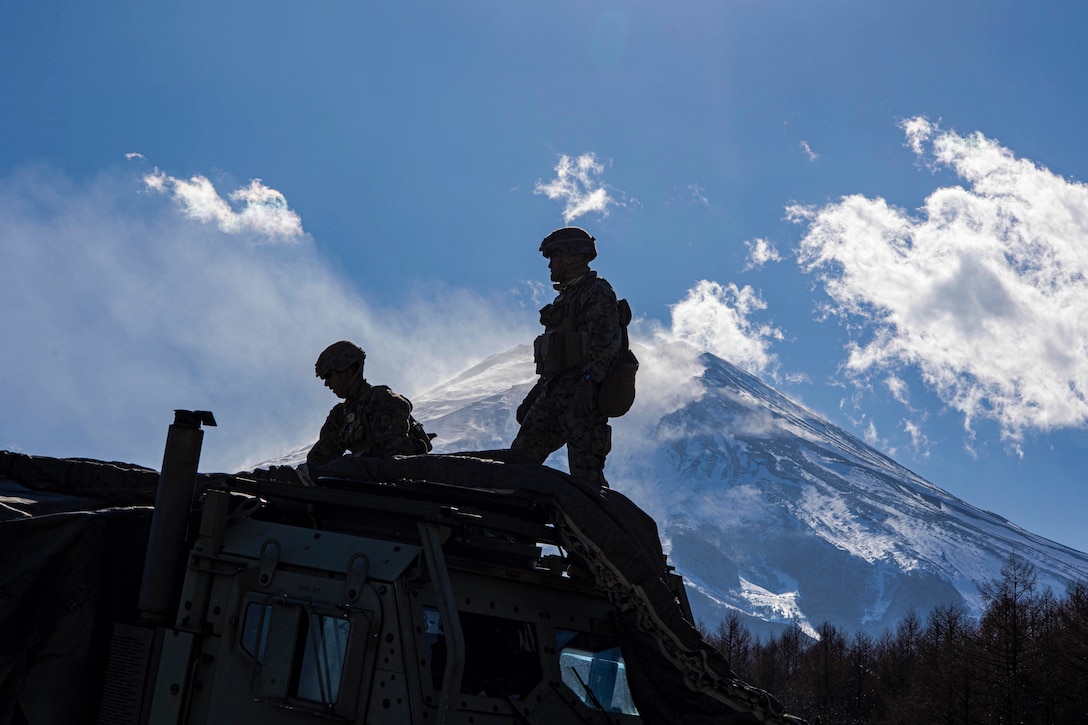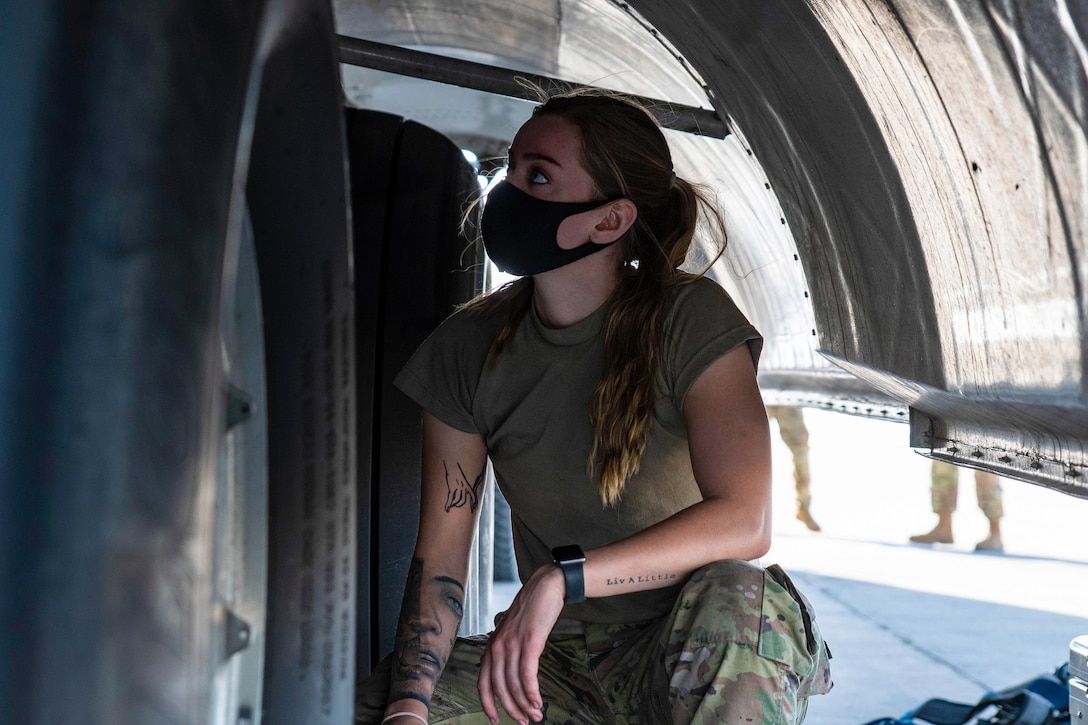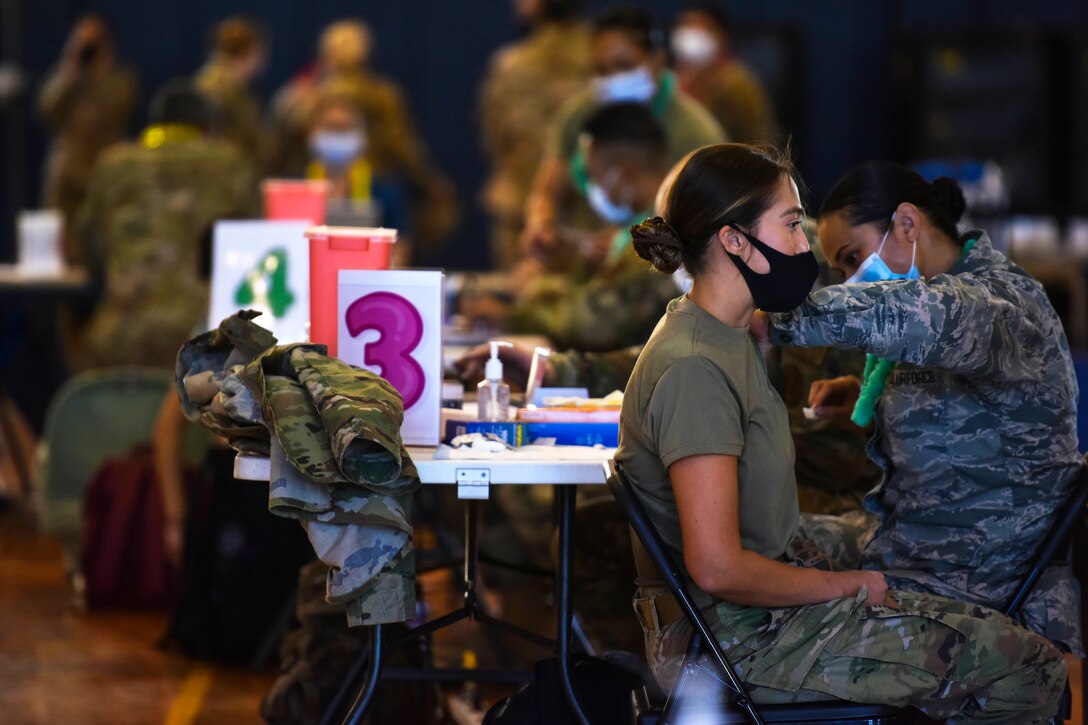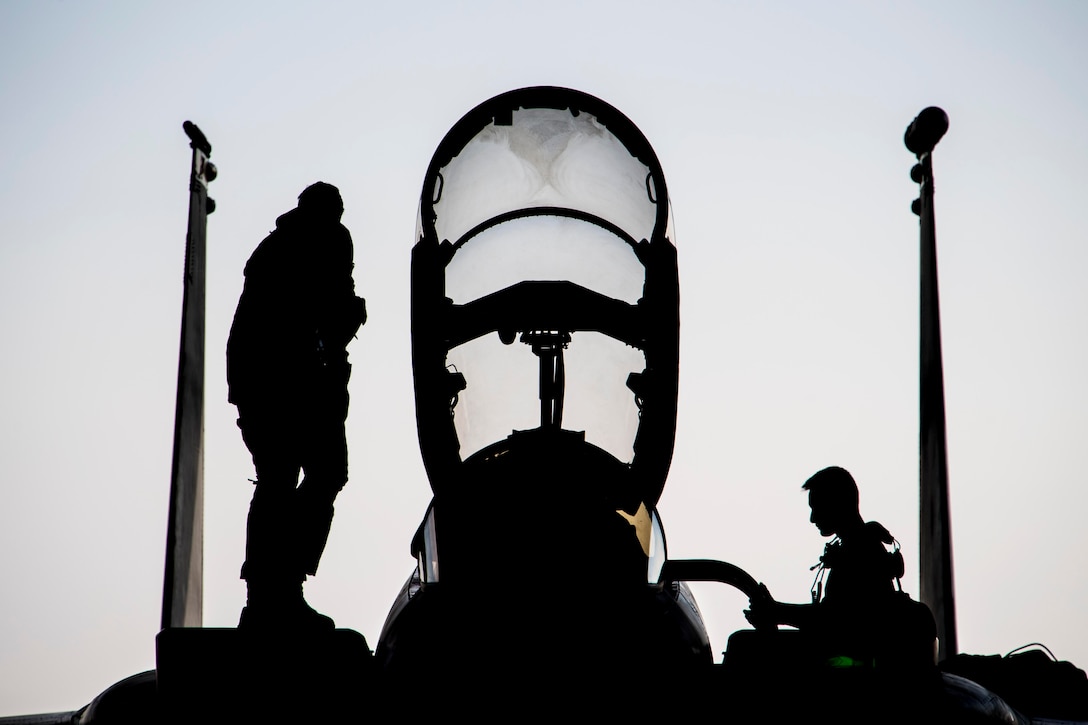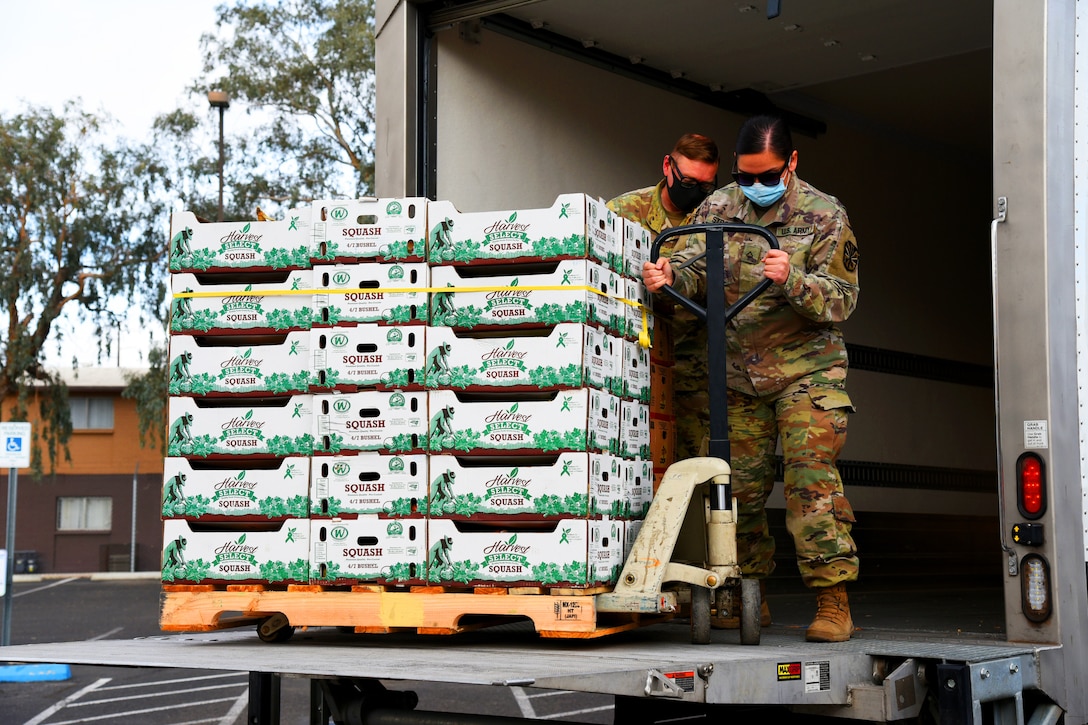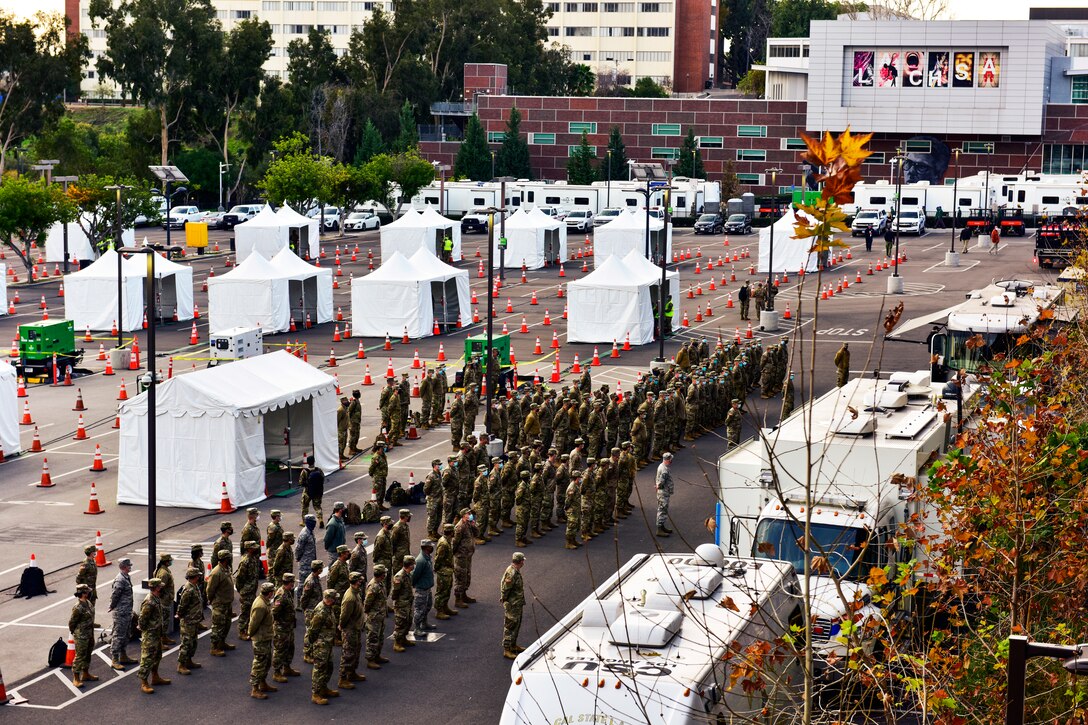Marines set up camouflage netting during artillery relocation training at Combined Arms Training Center, Camp Fuji, Japan, Feb. 5, 2021
Wednesday, February 17, 2021
Globemaster Check
Air Force Senior Airman Jillian Strickland performs a post-flight check on a C-17 Globemaster III at Ali Al Saleem Air Base, Kuwait, Feb. 12, 2021.
Joint Vaccine
The 15th Medical Group hosts the first COVID-19 mass vaccination at Joint Base Pearl Harbor-Hickam, Hi., Feb. 9, 2021. Hawaii Military Medicine has begun providing the COVID-19 vaccine to eligible personnel on a voluntary basis.
Eagle Landing
Air Force Capt. Ryan Heil stand on an F-15E Strike Eagle shortly after landing at Al Dhafra Air Base, United Arab Emirates, Feb 13, 2021.
Produce Delivery
Army Pfc. Valerie Strong and Army Sgt. Nathaniel Jones, both heavy vehicle operators with the 2220th Transportation Company, unload boxes of produce at a library to be distributed to local citizens in Tucson, Ariz., Feb. 16, 2021. The soldiers transported the produce from Nogales, Ariz., as part of the Arizona National Guard’s support of community needs during this state of emergency response.
Mega Point Distribution Site
California Air National Guardsmen assigned to Joint Task Force Mustang attend a morning briefing at the California State University campus in Los Angeles, Calif., Feb. 15, 2021. The task force has been activated to support the Federal Emergency Management Agency’s and the California Governor’s Office of Emergency Services’ first whole-of-government, mega point of distribution site for the COVID-19 vaccine.
NATO Defense Ministers Aim for New Chapter in Alliance History
Feb. 17, 2021 | BY Jim Garamone , DOD News
Europe and North America have an opportunity to open a new chapter in the security relationship within NATO, and the alliance defense chiefs are examining proposals during their virtual defense meeting, NATO Secretary General Jens Stoltenberg said in Brussels today.
It's Secretary of Defense Lloyd J. Austin III's first ministerial in his current role. The secretary has said he wants to rebuild U.S. alliances around the world.
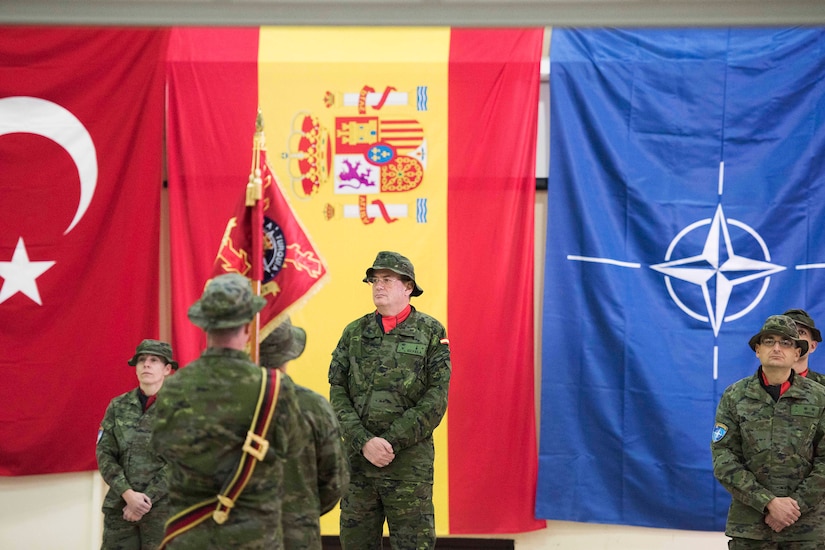
Today's discussions centered on proposals that could be part of the package presented to the alliance's heads of state when the NATO summit is held in Brussels later this year.
The defense chiefs examined proposals including strengthening allied commitment to deterrence and defense by providing incentives to contribute more capabilities and ensure fairer burden sharing, Stoltenberg said. "We also need to raise our level of ambition when it comes to resilience, which is our first line of defense," he said during a virtual news conference. "And we must do more to promote transatlantic cooperation on defense innovation so that NATO keeps its technological edge."
The ministers discussed increasing political coordination within NATO. Stoltenberg has said he favors using the organization more as a platform for consultation and coordination on more issues and in more formats. "At the same time, we need to enhance our political and practical cooperation with like-minded democracies around the world, so we can protect the rules-based order, which is undermined by countries that do not share our values, like Russia and China," he said.
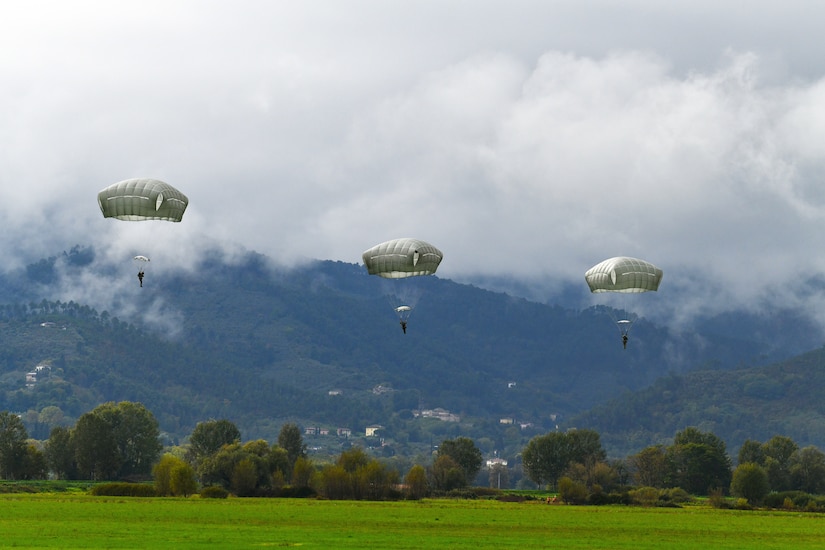
The ministers also discussed burden sharing. The secretary general noted that 2021 is the seventh consecutive year of increased defense spending by European allies and Canada. Nine allies will reach the goal of spending at least 2 percent of gross domestic product on defense this year; three met that goal in 2014. Since that year, European allies and Canada have cumulatively contributed an extra $190 billion.
"We are making real progress," Stoltenberg said. "But we must all keep the commitments we have made and continue to invest in our defense and increase the readiness of our forces. This is the only way to keep our nation safe in a more unpredictable world."
Tomorrow, the ministers will discuss NATO operations in Afghanistan and Iraq.
Readout of Defense Secretary Lloyd J. Austin III Remarks at Day One of the NATO Defense Ministerial
Feb. 17, 2021
Secretary of Defense Lloyd J. Austin III participated in his first NATO Defense Ministerial as the U.S. Defense Secretary today, providing remarks during two separate sessions. The first session discussed deterrence and defense, burden sharing, and Secretary General Stoltenberg’s ‘NATO 2030’ initiative. The second session discussed trans-Atlanticism, NATO-EU relations, Alliance resilience, and emerging and disruptive technologies.
The Secretary reaffirmed the President’s message that the United States intends to revitalize our relationship with the NATO Alliance and that our commitment to Article 5 remains ironclad. Secretary Austin referred to NATO as the bedrock of enduring trans-Atlantic security and said the Alliance serves as the bulwark of our shared values of democracy, individual liberty and the rule of law.
Secretary Austin emphasized that NATO’s most important task is to protect our populations and territory by presenting a credible deterrence and strong defense. He cited the multiple threats and challenges facing the Alliance including: Destabilizing behavior by Russia, a rising China, terrorism, and global challenges such as COVID-19 and climate change.
The Secretary thanked Allies for the seventh consecutive year of growth in defense spending and noted the importance of building on this progress. He also encouraged his colleagues to fulfill the 2014 Wales Summit Defense Investment Pledge where all Allies agreed to move toward spending two percent of GDP on defense and 20 percent of defense funds on modernization by 2024. Secretary Austin noted that defense spending is essential to ensuring we have the ready forces and capabilities needed to address Russia and other challenges to NATO.
On the ‘NATO 2030’ initiative, the Secretary supported the overarching goals of ensuring the Alliance remains strong militarily, becomes stronger politically and takes a more global approach.
The Secretary welcomed recognition by NATO Allies that China’s growing influence and international policies present challenges to trans-Atlantic security and looks forward to working together to address these challenges.
Secretary Austin welcomed the unique opportunities offered by increased NATO Partnership with the European Union, including efforts by EU countries to build capabilities that add value to our trans-Atlantic security, but emphasized that the NATO Alliance remains the essential forum for consultation, decision and action on issues impacting our collective security.
The Secretary closed his remarks during the second session by discussing the importance of working across the Alliance to improve early adoption of emerging and disruptive technologies, as well as the need to protect our supply chains, infrastructure and technologies from strategic competitors. He also emphasized the Department’s commitment to working with NATO to ensure democratic nations remain global hubs for innovation.
Secretary Austin thanked the allies for the opportunity to discuss these important issues and looks forward to continued consultation going forward.
